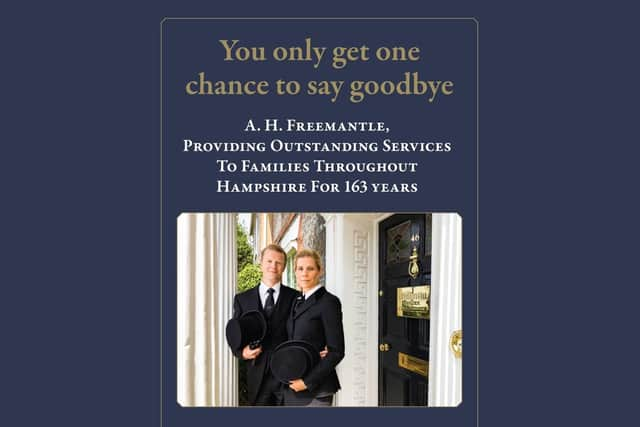A H Freemantle's 5 top tips when planning a funeral tribute


But all families should at some point have a discussion to decide on what sort of funeral people would prefer.
It might be a very brief conversation at the pub along the lines of ‘I would rather be buried/cremated’, or even ‘I really don’t care, I won’t be around’. At least it’s a start.
Funerals, broadly speaking, fall into three categories of religious, less religious and non-religious.


Whatever your religion, the customs and traditions of a familiar structured service can offer great peace of mind in your place of worship.
Non or less religious funerals have edged away from the very traditional, emphasising the life of the person.
Either service has flexibility to add personal touches such as musical or spoken tributes.
Spoken tributes are key to a ‘good’ funeral .
‘He liked to drink and he liked to fight’ was the shortest (and most unusual) tribute I’ve heard over the years.
So what needs to be considered when planning and delivering a good tribute?
At A H Freemantle we suggest families consider the following five points:
1) Less is more. No, it really is. The temptation to cover every detail is overwhelming, particularly if they have had a long life. But typically around 4-5 minutes is about right.
2) Keep it personal. Short stories rather than lists of facts are more interesting to listen to. Ideally these will be stories where you were involved. Make sure it’s more about them than you though!
3) Keep it positive. If there are difficult topics to cover, the congregation will probably already be aware. You don’t need to break the news to them during the funeral.
4) Keep a written copy to hand. Don’t risk standing up with only bullet points. If overcome with emotion someone else can stand in and help with a speech written in full. Use a large font if you’re typing it out.
5) Keep it conversational. Talk clearly and slowly. Look at your listeners and make eye contact while talking to them. You are sharing your personal experiences with them and they are as privileged as you are to be a part of this, but that doesn’t mean you need to lecture them.
Always remember that everyone there is behind you 100%, so stay calm and take your time.
For further thoughts, visit AHFreemantle.co.uk or call us on 01329 842115.
By James Keen, managing director of A H Freemantle Funeral Directors